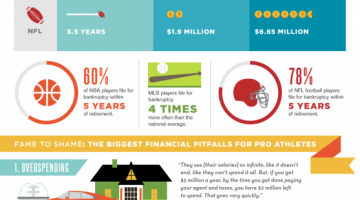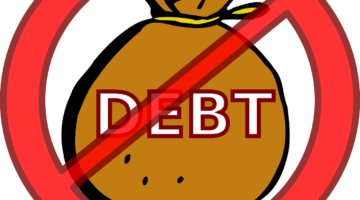The Fair Credit Reporting Act (FCRA) prohibits credit bureaus from reporting accounts that have been placed for collection or charged off for more than seven years. What Does This Mean For You? The creditor (known as a “furnisher” under the FCRA) is required to tell the credit bureau the date of the first delinquency because the seven years actually begins to run 180 days following that date. After the seven years expires, the debt’s “trade line” is supposed to ageRead more
Think That Pro Athletes Immune to Financial Trouble? Think Again.
Now that the Super Bowl is over (let’s not discuss the final score), high school and college athletes everywhere are dreaming of making it big in pro sports. Contracts worth millions of dollars are possible even for athletes not selected high in any pro draft. But, just like you and me and all of our clients, money problems aren’t foreign to even some of the wealthiest of pro sports players. In fact, there’s some evidence to suggest these wealthy playersRead more
Chapter 13 More Likely to Save Homes
A recent study confirms what many of us have known for some time: Filing Chapter 13 bankruptcy is one of, if not the best way to keep people in their homes Researchers from North Carolina looked at the cases of nearly 4,300 homeowners across the country. All of whom were more than 90 days late on their 30 year fixed rate mortgages. The study said that when homeowners filed bankruptcy, sales of their home were 70% less likely to occurRead more
Modifying a Chapter 13 Plan
Clients considering a Chapter 13 bankruptcy are often afraid they’ll be stuck in a payment plan they can’t afford if something changes. Your life doesn’t stop just because you file Chapter 13 bankruptcy so the chances of unforeseen circumstances disrupting a budget are good. Some clients go the entire 3-5 years without needing a modification but don’t worry if something happens that requires a change in the plan payment. Unforeseen Circumstances May Include Job loss car repairs home repairs medical bills, taxRead more
Cosigned Debt in Chapter 13
What Is Co-Signing? Co-signing a loan for someone means you’re making yourself fully responsible for repayment of the loan. While there may be an agreement between the co-signers as to who is going to make the payments, the lender doesn’t need to honor that agreement. They just want to see the loan repaid, regardless of who pays. What Happens When You Include Chapter 13? When a Chapter 13 bankruptcy is filed an “automatic stay” goes into place that prevents lendersRead more
Making Chapter 13 Plan Payments
What Should You Expect? Clients in Chapter 13 bankruptcy can make their Chapter 13 plan payments several ways. In Iowa the Chapter 13 trustee doesn’t accept personal checks and can’t do withdrawals from bank accounts but money orders or cashier’s checks can be mailed to the trustee each month. The debtors’ name and case number should be put on the money order or cashier’s check. The best way to make plan payments is a wage deduction order. These wage deductionsRead more
Mortgage Modifications
Mortgage Modifications Success & Failure A new report released in January 2013 from the NCLC reveals both the successes and failures of mortgage modification programs used by top mortgage lenders and servicers. As many as ten million homes are still estimated to be at high risk of foreclosure. With nearly four million foreclosures having been completed between 2007 and 2012. The report looks at the track record of the Home Affordable Modification Program, created in 2009 to address the needRead more
How Does A “Chapter 20” Bankruptcy Work?
Most people are familiar with Chapters 7, 11, 12 and 13 of bankruptcy. Chapter 12 is for family farmers. Chapter 11 is often used by large corporations. Chapters 7 and 13 are used for consumers But what’s a “Chapter 20?” You won’t actually find mention of Chapter 20 anywhere in the bankruptcy code but it’s the commonly used name for a Chapter 13 following a Chapter 7. But why would anyone file two bankruptcies, one right after the other? HereRead more
Foreclosure Scams: Beware!
Scam-artists are trying to cheat Iowans caught up in the nationwide foreclosure crisis. Mortgage foreclosure “rescue” schemes ask you to pay thousands of dollars up-front for so-called assistance or “rescue” from foreclosure. But, they just take your money and do little or nothing to help. The scam puts you in a deeper financial hole, does nothing to save your home and diverts you from getting real help. The Iowa Attorney General’s Office has received scores of complaints from families connedRead more
Sheriff Sales
According to the latest reports, over 4000 Iowans who have a Fannie Mae or Freddie Mac mortgage loan are delinquent in their payments. The number of delinquent borrowers is even higher when you include non Fannie or Freddie loans. What is a sheriff sale? A sheriff’s sale is the final step to getting out from under a home they can’t afford. Many people are deciding to walk away from mortgages that now far exceed the value of their home and theirRead more












